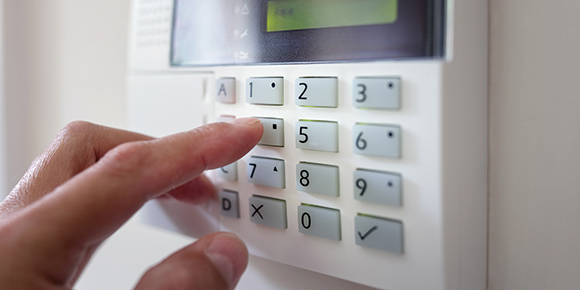By Todd Lewys
It’s official: your REALTOR® just called to confirm that your offer on your dream home has been accepted.
Now what?
Well, aside from taking care of closing costs, getting the house keys and securing the services of a reliable mover, you might want to think about how you want to protect the biggest investment of your life.
That means getting a security system for your home.
And seeing as 83 per cent of burglars try to find out if a home has a security system before attempting a burglary, purchasing a system could prove to be a savvy investment.
However, making that purchase isn’t a simple task.
Here are a few basic security system guidelines to get you started in your search for the system that’s right for you.
Home Monitoring – A home can be monitored in three ways: via a landline (phone), broadband (internet) or cellular (wireless). The landline option is outdated, as it’s not as secure as newer methods. The broadband option, which uses an internet connection for monitoring, is safer and faster than a landline, and less expensive than going the cellular route. However, if your internet goes down, your security system goes down. Using a wireless uplink to communicate with the monitoring centre, the cellular mode is faster than both a landline and broadband and is easier to install. Its downside? It’s more expensive!
Installation — DIY vs. Professional – Which to choose? Well, if you choose to install the security system yourself, it’s not only cheaper, but you get to decide where sensors go, and how the system is assembled. It can take anywhere from 40 minutes to two-plus hours, depending on your competency as an installer. For most folks, however, going the professional route may be best, as a professional technician takes care of everything. You can relax, knowing that the expert technician will optimize the system and do things right. There is a service charge, but it’s well-worth it in most cases.
Technology – The burning question here is do you go for a basic or advanced security system? In most cases, you can start out on a basic level, leaving room for future expansion. However, if you want to make your home as secure as Fort Knox, you may want to go for home automation, which entails choosing a more advanced security system. If you think you will make upgrades down the line, make sure the system you choose has the capability to be upgraded.
Package Features – It pays to remember that the right security system will be based on your needs, and possibly your budget. Young families just starting out may want to go the basic route and upgrade later; those with bigger budgets might be able to go with the Cadillac of systems right away.
Pricing – As is the case with any service whether it be a cell phone provider or home security company, pricing can be complicated. Some companies will let you use your own equipment, while others will want you to lease theirs. Buying allows you to re-use your equipment with another company or on your own; leasing comes with lower up-front costs and leaves repairs to the home security company. Also, get a clear breakdown on fees. There can be all kinds: monthly fees, activation fees, service fees, relocation fees and cancellation fees. Knowing what you’re getting in to can save money and heartache.
Customer Service – Above all, choose a security company that you’re comfortable with. Do they explain everything clearly regarding installation? Are all fees disclosed up front? Are the phone-based customer service representatives knowledgeable and courteous? Pay attention to customer service ratings and get feedback from family and friends on home security providers.
The key to choosing the right security system lies in doing plenty of research and getting feedback from others. Do that, and chances are good that you’ll find a security system that does a great job of protecting the biggest investment you’ll make in your lifetime.
tlewys4@gmail.com



